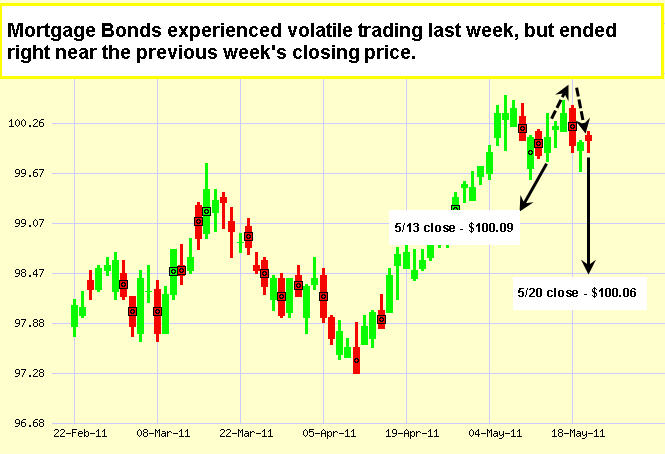For the week of May 23, 2011 — Vol. 9, Issue 21
| In This Issue… |
| Last Week in Review: The economy appears to be slowing… but what’s going on with home loan rates? Read the answer.
Forecast for the Week: A second chance for a better outlook? Here’s what to watch this week. View: Airfares are expected to rise and travel bargains may be harder to find. Read how you can still find deals! |
| Last Week in Review |
| “SLOW AND STEADY?” Last week, the economy appeared to be slowing. But despite the negative economic news, Bonds and home loan rates held steady and were unable to improve further.
Let’s look at what happened and what it means…  Housing Starts and Building Permits, which are leading indicators of the new home construction market, both came in below expectations that were already low. If you consider the significant amount of foreclosures and inventory overhang weighing on the market, it is no surprise to see a weak indicator on new home construction. Broadly speaking, foreclosures and short sales are expected to continue weighing on new home construction for the next couple of quarters… but as we all know, real estate is very local – so your particular market may be quicker or slower to improve. Manufacturing reports were also disappointing last week. For example, Industrial Production, Capacity Utilization, and the Philadelphia Fed Manufacturing Index all came in below expectations – which helped Bonds last week. So why didn’t Bonds and home loan rates improve? The recent rally in Bonds and home loan rates was partly sparked on the notion that US economic growth will slow – which the economic reports last week seemed to indicate. And when you also factor that the only two ways the government can lower the budget deficit is either by cutting spending or raising taxes – or some mix of both – the austerity measures could indeed slow the economy. Normally, such soft economic data would help Bonds and home loan rates. But last week, Bonds had trouble making gains because – despite the negative economic headlines – some of the reports included data that was unfriendly to Bonds. Here’s an example… Last week, the Empire State Manufacturing Index was reported a lot weaker than expected. But, when you look beyond the headline number, you see that the “Prices Paid” component of that report – which measures wholesale inflation – showed the highest rate of inflation in three years… and the second highest reading ever! Remember, inflation is the archenemy of Bonds and home loan rates. Additionally, the employment index of the Empire State Index was positive, which suggests hiring. And, in a separate report released last week, the Labor Department’s Initial Jobless Claims number also showed the lowest level of unemployment claims in a month. Not only was that a good number from the standpoint of beating expectations, but it also indicated that April’s surge in unemployment claims was more likely due to temporary factors rather than a worsening labor market. In the end, the positive employment news combined with the concerns over inflation offset some of the negative economic news last week and held Bonds and home loan rates in check. Both Mortgage Backed Securities and Treasuries traded dead on a ceiling of resistance last week. And unless Bonds can break above this ceiling, prices can’t improve further. I’ll be watching the markets closely this week to see if Bonds break above that ceiling this week. Even if they don’t, the good news is that home loan rates are already historically low and present an ideal situation. If you or someone you know is looking to purchase a home or refinance, please call or email today to see how you can benefit from that situation. |
| Forecast for the Week |
|
A second chance for better news? We’ll see new reports this week on housing and inflation. Here’s what to watch:
Remember: Weak economic news normally causes money to flow out of Stocks and into Bonds, helping Bonds and home loan rates improve, while strong economic news normally has the opposite result. As you can see in the chart below, last week was volatile – with Mortgage Bonds moving up and down before ending the week near unchanged. Chart: Fannie Mae 4.0% Mortgage Bond (Friday May 20, 2011)
 |
| The Mortgage Market Guide View… |
| How to Beat Rising Summer Travel Costs
Timing and destination matter if you’re looking to save. By Cameron Huddleston, Kiplinger.com Finding travel bargains this summer may be a littler harder. Airfares are expected to rise 15% to $561, on average, from $485 last summer, according to Bing Travel, a Web site that predicts fares. And hotel costs are expected to rise 7% to $242 a night, on average, from $227 in 2010. However, you still can find deals if you travel at the right time and to the right spots, and book flights as soon as possible, according to the Bing Travel summer forecast. When to travel. The cheapest week to travel this summer will be May 30 to June 5, when airfares will average $518 for a round trip, according to the Bing forecast. The priciest week will be June 27 to July 3, when airfares will average about $595. Where to travel. Orlando, Fla., will be among the cheapest destinations, with roundtrip airfare averaging $300 and hotel prices averaging $107 per night. You’ll also find deals on flights to Boston and Denver. Las Vegas has some of the lowest rates on three-star accommodations, and you also can find deals in Miami and San Diego. Hotel prices in Cancun actually are cheaper this year ($145, on average, at three-star hotels), and flights from certain airports (Boston, Dallas and Chicago) to the Mexican city are cheaper. Traveling overseas this summer will be more expensive, with the airfare averaging $1,250, up from $1,100 last summer. When to book your travel. Book flights as soon as possible. “Travelers who are planning to wait out the rising fares in hopes of finding a deal will likely be disappointed,” says Krista Pappas, global travel industry director at Bing. More ways to save: Be flexible. If you don’t need to travel on a specific date, Bing Travel will show you when fares are cheapest to a destination of your choice. The Buzz tool at Kayak.com lets you search for flights that leave within a calendar month so you can find the lowest fare. If you’re looking to get away but don’t have a particular destination in mind, Airfarewatchdog.com will show you the cheapest flights out of the airport nearest to you. You also can save if you’re flexible about which airport you fly out of or into (see How to Save on Last-Minute Flights). Avoid baggage fees. If saving money by being flexible isn’t an option, at least don’t pay more than you have to when you fly. Only Southwest Airlines lets you check two bags for free. Most of the other airlines charge about $25 for your first checked bag and $35 for a second checked bag. So pack lightly in a carry-on or consider shipping your luggage, especially if you have overweight or oversize bags that will cost significantly less to ship. Consider Priceline. I save big on hotel rooms whenever I use Priceline’s Name Your Own Price feature. You won’t know which hotel you’re booking until you pay, but you can increase your odds of getting the hotel you want by following these tips. Consider a vacation rental home, especially for longer stays. Renting an apartment, condo or house can often be cheaper than a hotel room. Plus, you’ll have access to a kitchen, so you won’t have to pay for pricey restaurant meals. Check HomeAway.com or VRBO.com. For more ways to cut costs, see 20 Secrets to Save on Travel. Reprinted with permission. All Contents c2011 The Kiplinger Washington Editors. www.kiplinger.com. Economic Calendar for the Week of May 23-27, 2011 Remember, as a general rule, weaker than expected economic data is good for rates, while positive data causes rates to rise. Economic Calendar for the Week of May 23 – May 27
|
|
The material contained in this newsletter is provided by a third party to real estate, financial services and other professionals only for their use and the use of their clients. The material provided is for informational and educational purposes only and should not be construed as investment and/or mortgage advice. Although the material is deemed to be accurate and reliable, we do not make any representations as to its accuracy or completeness and as a result, there is no guarantee it is without errors.
|




Many thanks it is very useful for me !